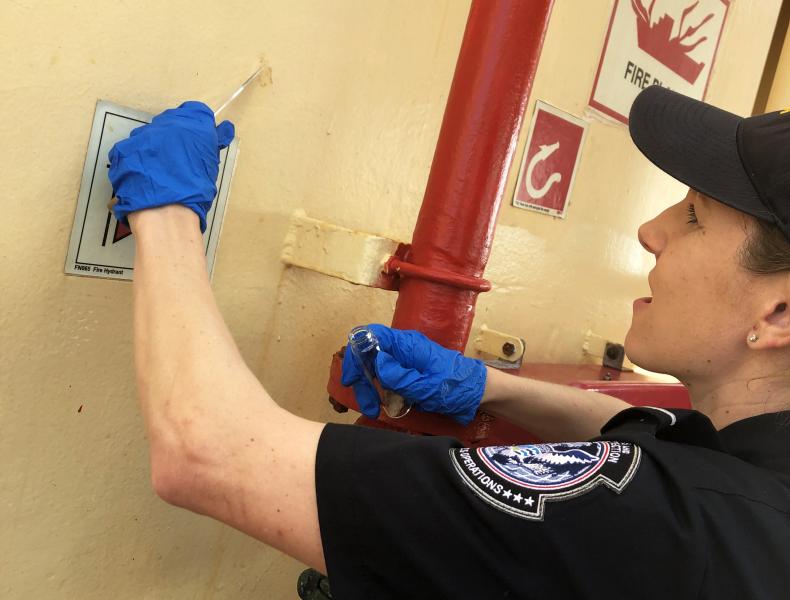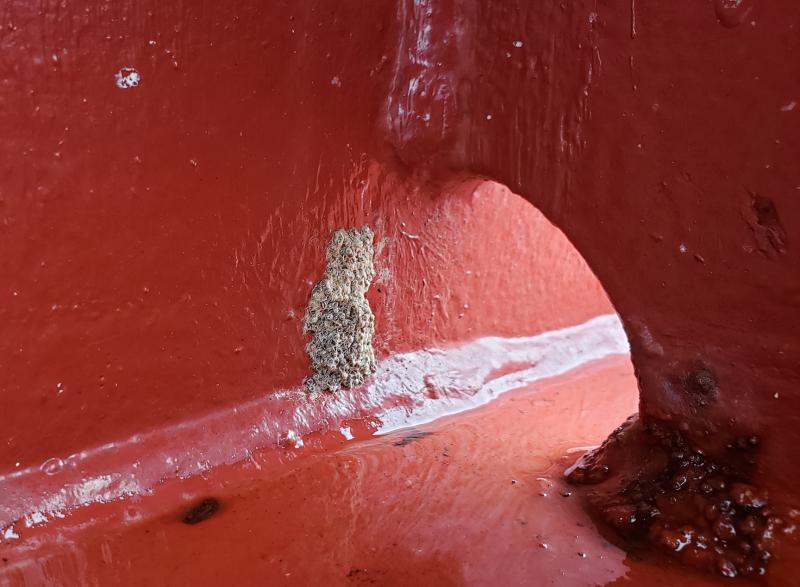Agriculture Specialists Discovered AGM Egg Masses on three ships in July
BALTIMORE – U.S. Customs and Border Protection (CBP) agriculture specialists intercepted 146 destructive Asian Gypsy Moth egg masses on four ships recently in the port of Baltimore.

Asian Gypsy Moth egg masses on four
ships at the Port of Baltimore recently.
Asian Gypsy Moth (AGM) is one of the most destructive insect pests in the world. They are not known to occur in the United States. If they would become established here, they could cause serious, widespread damage to our country’s landscape and natural resources.
In July, Baltimore CBP agriculture specialists intercepted five AGM egg masses from three vessels.
These latest interceptions occurred during the last two weeks.
- September 4, CBP agriculture specialists detected 126 AGM egg masses aboard the bulk freighter HL Baltimore, which arrived direct from Singapore. The ship previously made port calls to South Korea and China, both high-risk AGM regions.
- August 28, CBP agriculture specialists detected one AGM egg mass aboard the vehicle carrier M/V Thalatta, which arrived from Great Britain with four previous port calls in Japan and two port calls in South Korea. All ports are a high risk for AGM.
- August 26, CBP agriculture specialists detected two AGM egg masses aboard the vehicle carrier M/V Dignity Ace, which arrived from Spain with previous port calls to four ports in Japan, all a high risk for AGM.
- August 23, CBP agriculture specialists detected 17 AGM egg masses aboard the bulk freighter M/V United Adventure, which arrived direct from Japan, a high-risk AGM region.
“Asian Gypsy Moth is a highly destructive invasive pest, and it poses a clear threat to our nation’s natural resources,” said Casey Durst, CBP’s Director of the Baltimore Field Office. “Here in Maryland, Customs and Border Protection agriculture specialists continue to exercise extraordinary vigilance and conduct stringent inspections of vessels and their cargo in the fight to protect agriculture and economic prosperity locally, and nationally, from these invasive pests.
CBP agriculture specialists removed the egg masses and treated the affected area with a pest spray oil. Each ships’ crew assisted in mitigation efforts under CBP direction and supervision.

CBP submitted all specimens to the local USDA-APHIS-Plant Protection and Quarantine identifier, who identified the Egg Masses as Lymantria dispar asiatica/japonica, or AGM.
According to the USDA, AGM poses a significant threat to our nation’s forests and urban landscapes as it is known to be extremely mobile – females can travel up to 25 miles per day – can lay egg masses that could yield hundreds of hungry caterpillars, and is itself a voracious eater that attacks more than 500 species of trees and plants.
CBP agriculture specialists and USDA Animal and Plant Health Inspection Service (APHIS) inspectors have conducted training with Asian authorities to help lower AGM risks. Additionally, vessels making port calls in Asia generally implement stringent inspections to detect and remove egg masses, and foreign governments in Asia inspect and certify that vessels departing their ports are free of AGM or egg masses.
CBP agriculture specialists perform a critical border security role in safeguarding America’s agricultural and natural resources from harmful pests and plant diseases. They have extensive training and experience in the biological sciences and agricultural inspection, inspect tens of thousands of international air passengers, and air and sea cargoes nationally being imported to the United States.
During a typical day last year, CBP agriculture specialists across the nation seized 4,552 prohibited plant, meat, animal byproduct, and soil, and intercepted 319 insect pests at U.S. ports of entry.
See what else CBP achieved on a typical day during 2018, or by visiting www.CBP.gov.

